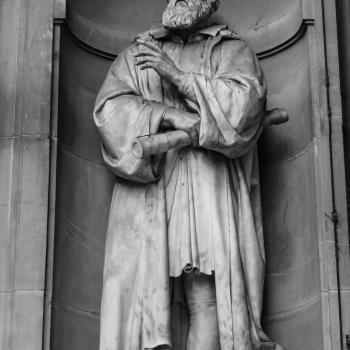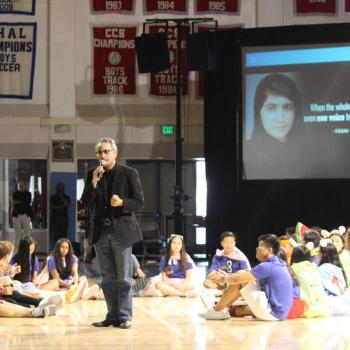 By Jim Burklo
By Jim Burklo
Progressive Christians of today are gifting the church of the future with fresh ideas. I believe these ideas will have influence far out of proportion to the numbers of people who belong to progressive churches today.
The institutions of mainline/liberal Christianity, and of the old-line conservative churches as well, are in steady decline. I doubt that this will change for the foreseeable future. Many local churches, across the theological spectrum, are dying of maladaptive habits. They are burdened with dull worship, decaying buildings, ponderous organizational processes, and shrinking resources.
But amidst this institutional ruin, wildflowers are bursting into bloom. Some progressive churches are thriving and growing. There is no one formula for their well-being except a willingness to do things very differently. Some of them don't own buildings and put most of their resources into engaging worship and missions of service. Some of them keep the outside trappings of the mainline church, but shift their programming and simplify their organizations. For a sneak peek at the future, see Wellspring Community Church in Des Moines, IA, Christ Community Church in Spring Lakes, MI, and St. Gregory of Nyssa Episcopal Church in San Francisco, CA.
Remarkable creativity is springing out of hundreds of progressive congregations and groups in the U.S. today. New music and liturgy is being created, leaving supernatural theism and biblical literalism behind, and embracing anew the long tradition of mystical, experiential faith that has always existed in Christianity. Fresh language is coming from these churches, bridging the realms of science and religion, and expressing a pluralistic understanding of Christianity in relation to other faiths. They are engaging creatively with the great social and environmental challenges facing the world. It's a theological reformation.
This progressive reformation is already having an impact beyond the churches that identify with its post-orthodox theology and social perspective. Echoes of it are to be found in the "Emergent Church" movement among evangelicals who are fed up with the box-store culture of megachurches and the over-identification of their faith with the hard political right. The progressive reformation will give an accessible theological language to the increasing number of people in America who are heterodox in their religious views (see the Pew Forum on the ways Americans mix religious traditions). As more mosques and Buddhist temples appear even in the Bible Belt, it will be harder and harder for parishioners to believe it when their pastors tell them that other religions will lead only to hell. Already, a majority of young evangelicals believe that other faiths can lead to eternal life (Pew Forum: We're All Theologians).
In my role as the associate dean of religious life at a university, I see the future as students pay me visits for conversation or counseling. In line with Pew Forum's statistics, fewer are identifying with a particular religion, and more are "spiritual but not religious." One striking development I've witnessed is that more and more gay and lesbian students are coming out of the closet and staying in their evangelical churches. When I first got involved in religious programming on college campuses, such students would drop out of their churches, convinced they'd never feel welcome. But now, many of them tell me they are staying. They have found ways to reconcile their sexual identities with their understanding of scripture. They feel enough support behind them to challenge their pastors on the subject, citing Bible verses to back their arguments.
I predict that further such challenges to conventional authority in conservative churches will happen as progressive Christian spirituality spreads virally. There will be more and more Bishop Carlton Pearsons who discover another way to practice the faith without leaving common sense and compassion in the church parking lot before going to worship. Progressive Christians and their churches will provide the seed corn and the fertilizer for this harvest of change.




